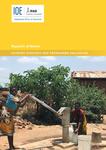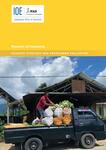Page Header
Republic of Peru Country Strategy and Programme Evaluation
Overview
This is the first country strategy and programme evaluation conducted by the Independent Office of Evaluation of IFAD in Peru. The evaluation covers the period 2002-2016 and includes six projects. The partnership between IFAD and the Government had a significant impact on rural poverty reduction and in particular on beneficiary empowerment and community management of natural resources. IFAD's funded operations attributed a monetary value to cultural assets and led to the creation of a knowledge market that lent dignity to campesino culture. Each project was unique, with its own features that contributed to a wealth of cumulative experiences and stimulated innovation and scaling up. The evaluation concludes that IFAD's specialized role in fighting poverty and promoting rural development will continue to be important for Peru, due to persistent rural/urban inequality and the fundamental role of family farming as an engine of production and for feeding the population. Despite the significant results achieved in terms of poverty reduction, beneficiary empowerment and innovation, there are some weaknesses that were observed at the strategic level. IFAD's comparative advantage in terms of its presence in remote rural areas and ability to reach the poorest people through the targeting strategy was not fully exploited. The concept of a territorial approach was neglected and the projects did not explicitly address environmental sustainability and climate change resilience. Finally, the Country strategic opportunities programme (COSOP) was not sufficiently used as an instrument for strategic guidance. Among the main recommendations of the evaluation are to draw up a strategy to target interventions to the poorest and most vulnerable rural people, bring back the territorial approach, build in climate change as a strategic drive of IFAD-promoted interventions and adopt a programmatic approach to COSOP preparation.Report Details
| Year Published | |
| Type | |
| Joint | No |
| Partner/s | N/A |
| Consultant name | Eduardo Zegarra |
| Agency Focal Point | Simona Somma |
| Focal Point Email | s.somma@ifad.org |
| Managed by Independent Evaluation Office | Yes |
| Country/ies |
YOU 'RE READING
Republic of Peru Country Strategy and Programme Evaluation











